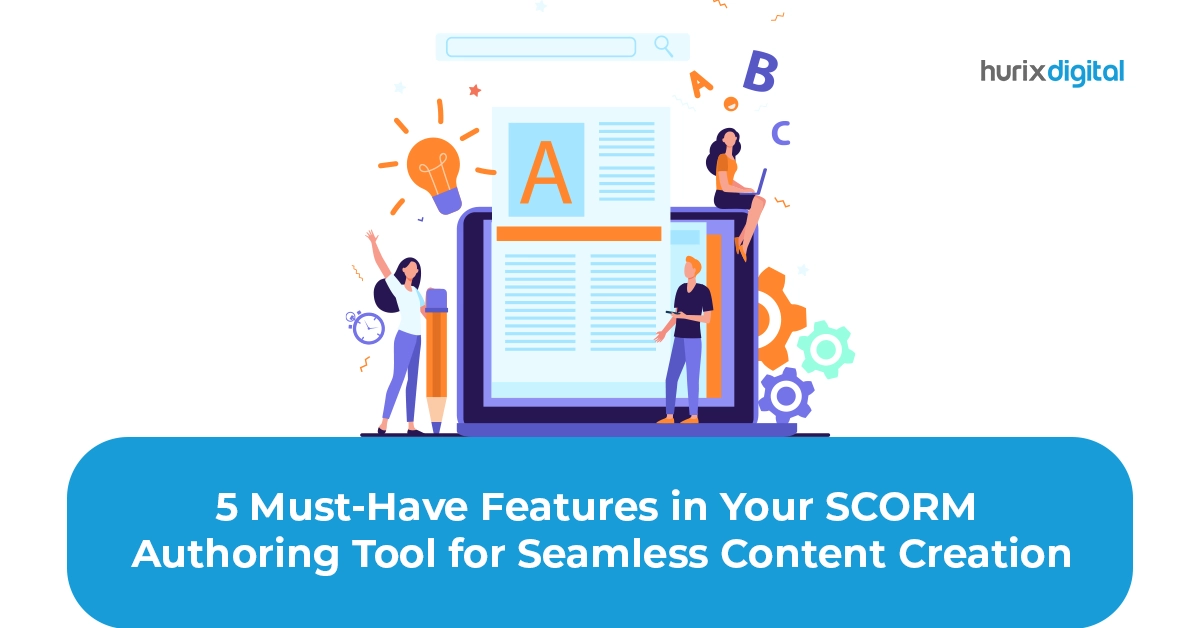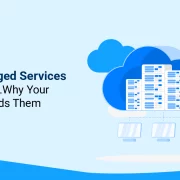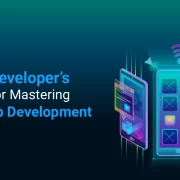
Choosing the Right eLearning Content Development Service Provider
With the digital footprint fast-growing in every walk of life, eLearning is taking center stage in enterprise training as well as academic learning. It is no longer looked at as an alternative or a supplementary tool to support learning objectives but as a go-to choice to deliver customized and pointed content modules. Therefore, incorporating effective eLearning programs remains a crucial for organizations across the board.
Today, eLearning is projected to be worth $325 billion by 2025. 98% of organizations, of various sectors, around the world have had plans to use eLearning. One of the best features is that eLearning takes 40%-60% less time to complete as compared to traditional learning.
To be able to meet such goals, opting for a robust eLearning content development provider is essential.
Here is all you need to know about choosing one whose services and capabilities align perfectly with your training objectives.
Table of Contents:
- Factors to Consider Before Choosing the Best eLearning Service Provider
- How to Choose the Right eLearning Content Development Service Provider?
- How Do Custom eLearning Content Development Services Support Learners and Organizations?
- Conclusion
Factors to Consider Before Choosing the Best eLearning Service Provider
Before you go looking for an eLearning content development provider, you must have your requirements chalked out. If you skip over this process in a rush to find a vendor to collaborate with, even the best content development providers cannot do justice to your needs.
To avoid that eventuality, you need to focus on three key factors:
1. An eLearning Strategy
A clearly defined strategy is critical for the successful incorporation of eLearning into any professional setup. For this, you should focus on the following elements:
- The objective for which you are adopting an eLearning program
- A timeline for implementing it
- A detailed outline of the components you want to incorporate in your eLearning modules
- Performance and support resources you need for these modules to function seamlessly
- The frequency at which you’d need these components updated or revised
- The tech tools necessary for the dissemination of your eLearning program
- Criteria for performance evaluation
2. Capabilities vis-a-vis Requirements
Before you jump to find an eLearning content development provider, take a long, hard look at your current and future capabilities. Evaluate them vis-a-vis your eLearning requirements. If you are just testing the waters with a generic course to understand the receptiveness of your workforce, purchasing ready-made eLearning programs is a more sensible choice.
Similarly, if it’s a one-off training program, explore the resources within your organization – quality content writers, efficient developers, and so on – to see if the course material can be created in-house.
Only when you’re ready to embrace employee upskilling and training as an integral part of your work ethos should you consider working with a third-party content development provider who can take care of your extensive, ongoing requirements.
3. Identify the Necessary Skill Sets
Once your eLearning initiatives venture outside the confines of isolated efforts, it’s vital to identify the skill sets needed to implement such projects. Some that are most commonly required for any eLearning program include:
- Instructional Designer
- Content Writer
- Subject Matter Expert (SME)
- Graphic Designer
- Programmer
- Quality Checker
- Project Manager
Also Read: 7 Factors to Consider for Large-Scale eLearning Content Localization
How to Choose the Right eLearning Content Development Service Provider?
With this broad framework as a point of reference, you can start looking for the top eLearning content development service providers and identify the one best suited to your requirements.
Today, there is no dearth of third-party vendors providing customized services. Among the myriad options available to you, choose the one that fares well on the following criteria:
1. Expertise and Experience
When looking at the expertise and experience of an eLearning content development service provider, don’t just focus on statistics and figures. Ask them for case studies, and take the time to evaluate the projects they claim to have completed successfully, and if they brought real value to the enterprises they were developed for.
Most importantly, see if any of their past projects are in line with your eLearning outline, objectives, and requirements. Experience in handling projects similar to yours is a big plus.
2. Evaluate Resources
You are going to entrust these people with an important project, one that will benefit from a long-term collaboration. It is only wise to look at the individual profiles of the different members who would be working on your eLearning requirements to assess if they’ve got what it takes to deliver results.
If you feel the need for it, don’t hesitate to schedule one-on-one meetings with each team member to ascertain their grip on their respective fields of work.
3. Ask for References
Some eLearning content development providers may not be able to give you details on the past projects they’ve worked on, owing to non-disclosure agreements. Be that as it may, you can always ask them for references from clients they have worked with.
Once again, try to look for clients whose projects closely resemble your requirements. Reach out to these businesses for feedback about the vendor’s performance. This will give you a fair insight into their capabilities and professionalism.
4. Company Size
When choosing an eLearning content development service provider, their company size does matter. Particularly if you’re seeking to make eLearning initiatives an integral part of your work culture.
You will need a strong partnership with your third-party vendor to sustain such an effort. Evaluate whether the company you’re considering for the job will be able to dedicate the same team of professionals for all your future requirements.
Are they financially stable enough to be in the business 5 or 10 years down the line? Is this firm too big in its size and footprint to take your project seriously? Switching over to a new vendor mid-way can disrupt your training initiatives.
Therefore, it is crucial to do your due diligence right in the beginning.
5. Scalability
Do you plan to scale up your eLearning initiatives over time? Can your content development partner meet those changing requirements? Do they have the resources for it? What if you decide to scale down in the future?
Are they willing to adjust the economics accordingly? Clear up these things upfront, and include these in the contract you draw up for them so that there are no unpleasant surprises down the road.
6. Transparency in Pricing
As an entrepreneur who doesn’t necessarily understand the inner workings of content development for eLearning programs, do you understand a potential partner’s pricing clearly? Are they honest and transparent? Is the ROI justifiable?
To rule out any budgeting disasters later, spend the time to understand this nitty-gritty. If you need, bring in a trusted ally or someone from your team who understands eLearning well to walk you through this often confusing maze of pricing.
7. Quality Assurance Practices
Does this service provider have robust practices and procedures in place for quality checks? Is there a dedicated team for it? Do they follow any defined guidelines or checklists?
How many layers of the quality check will the product pass through before it is delivered to you? These are all important questions that you must find the answers to before making up your mind to work with a content development provider.
How Do Custom eLearning Content Development Services Support Learners and Organizations?
Custom eLearning content development services offer focused solutions to meet the requirements of learners and organizations. Here is how these eLearning content development services make a difference:
1. Personalized Learning Experiences
Every learner is unique. Customized eLearning content development services enhance an individual’s skill level, role, and preference. For example, using such services, sales professionals can participate in negotiation scenarios, while IT teams can review system-specific modules.
Learners receive learning that is relevant to their roles. This makes training more engaging and retention-friendly.
2. Flexibility in Learning
Learners today need training that fits into their agenda. The best eLearning content development services support 24/7 access and offer mobile-friendly solutions, so learners can take study opportunities anywhere.
Flexibility enables busy professionals to learn at a time that is most available to them, reducing the stress of scheduling and increasing participation rates.
3. Complementing Organizational Goals
Custom eLearning content development services extend over the general content and consider the mission, culture, and purpose of a company.
From branded images to specific scenarios that would occur within an organization, the training follows the business’s identity and purpose.
Employees connect better with the company’s vision and know how their training directly impacts organizational success.
4. Cost-Effective and Scalable Solutions
While on-demand training events are usually associated with running costs, custom eLearning content has a one-time development cost. It can then be used repeatedly or for a large audience at no further cost.
5. Better Retention
Interactive content and multimedia-enriched resources create engaging learning experiences. Information is no longer passively received but is interactively learned through practice and application.
Relevant content keeps learners interested and stays in their memory for longer. Not only do they remember what has been taught but also, but they also learn how to apply it to real-world practice.
6. Industry-Specific Training
Each industry has specific requirements. Custom eLearning integrates targeted regulations, workflows, and best practices specific to the business.
Personalized content ensures that training is both applicable and compliant, which empowers learners with actionable knowledge. Employees become subject matter experts in processes specific to their roles.
7. Continuous Learning Opportunities
The best eLearning service provider solutions can be updated with new modules, trends, and refresher courses to keep employees ahead. Advanced lessons create a foundation and encourage progressive skill-building.
Employees feel empowered, and the organization benefits from having an up-to-date workforce where skills and knowledge are updated at all times.
8. Analytics and Insights
Data tracking and performance analytics are a part of all custom eLearning content development services. Organizations track scores, completion rates, and engagement levels to measure the efficacy of training programs.
These insights help organizations identify areas of strength and weakness, fill in gaps, and revise their training strategies. Data-driven decisions lead to ongoing improvement and better results.
9. Multilingual and Global Reach
eLearning content development services help deliver content in several languages for diverse teams across the globe. Localization ensures that the content is relevant to global learners.
Training in multiple languages promotes inclusivity and accessibility. It ensures all employees receive the same high-quality learning experience.
10. Fast-track Onboarding and Re-skilling
Custom eLearning through top-notch eLearning service providers can speed up onboarding through proper training for new hires. For existing employees, targeted modules can be used to upskill them for new roles or responsibilities.
The reason why this matters – employees get productive faster, with less time and cost implications or lengthy upskilling processes. This gives organizations a competitive edge.
Also Read: How to Find the Best Custom eLearning Services Provider
Conclusion
Your eLearning program is as good as the team that curates it. Making this selection count is imperative to meet your training goals and objectives. Taking the above-mentioned points into consideration will help you narrow down the best eLearning content development service provider to create compelling and engaging content for your training needs.
Partner with Hurix Digital for end-to-end eLearning content development services personalized to meet the specific requirements of modern organizations.
Get in touch with experts now to take advantage of engaging, scalable, and future-ready eLearning experiences!






